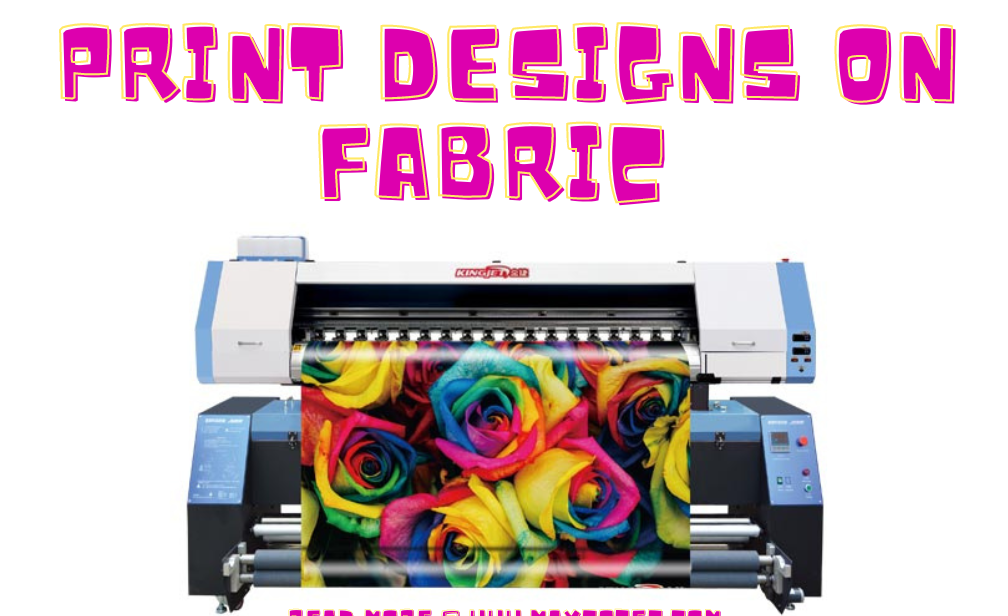Key Features:
- Digital fabric printing technology WordPress allows you to print designs onto fabric. It's a great tool for making custom shirts and outfits.
- Digital printing technology WordPress prints images digitally by converting an image file into a printer-readable format. Printing on fabric is made possible by printing your image onto the fabric.
- The latest digital printing techniques offer several benefits to businesses. Low cost per unit, printing multiple fabrics at once, the fastest turnaround time, and unlimited color options.
- WordPress printing technology has many advantages but also has some cons. High cost, has no real-time testing, and you cannot change the colors.
- The future of digital printing techniques is bright. As more people start using this technology, they'll be able to print out their clothes and textiles at home.
- Virtual fabrics and printing technologies have transformed the way of creating unique and personalized textiles.
Digital fabric printing technology is undoubtedly one of the most exciting things to happen in the fabric industry of late. Reputed vendors have brought about impressive upgrades to the industry, which has made the design and manufacturing of garments a lot smoother. What's more, digital fabric printing technology WordPress 2022 enables you to offer high-quality garments at affordable prices, leading to its widespread adoption.
Without a doubt, digital printing techniques have a significant impact on various sectors, such as the apparel and home furnishing industries. It improves the overall quality of life by enabling everyone -- from individuals to big clothing companies -- to tailor-make clothes per their needs with just a few clicks.
WordPress printing technology is undoubtedly one of the most exciting things to happen in the fabric industry of late.
Tech blog USA has already highlighted the innovation of digital fabric printing earlier this year.
What is Digital Fabric Printing Technology WordPress?
Digital fabric printing technology WordPress is an innovative way to print on fabrics. It uses the same principles as traditional screen printing but has a few key differences.
Digital fabric printing technology takes an image file and converts it into a format to use by the printer. It uses special software to convert your image into something printable onto fabric.

To start with, digital printing technology WordPress uses a digital printer to output images onto fabric. You create the images using software such as Adobe Photoshop or Illustrator. These programs allow you to manipulate and create graphics for your designs. Software controls the printer that tells it what color to use and where on the fabric to print.
Digital fabric techniques also use different materials than traditional screen printing. Most digital printers use water-based inks instead of oil-based inks, which tend to be more expensive and harder to control when used on fabrics. It also uses a heat press machine instead of a hand-cranked tool or roller system used in traditional screen printing processes.
How does WordPress Printing Technology Work on Fabric?
Digital fabric printing technology WordPress has become quite popular in the last few years because of its broad range of uses. Businesses can use it to print on textiles, paper, and even plastic.
It's also become much more accessible as it's gotten easier to use and less expensive. Many people are using fabric printing technology for home projects like decorating curtains or making clothes. This type of technology is also called digital textile printing or digital fabric printing. It works by applying an inkjet printer directly onto fabric to create designs with images or words on them.

There are several different ways that this process can work. Some digital printing techniques use water-based inks, while others use solvent-based ones; some printers require special solutions which must be applied before you print. Few need heaters installed into them so that they can dry quickly after being printed on, and some also require special machines called presses which help them dry faster when they're finished being printed on.
In short, WordPress printing technology works on fabric by applying a layer of ink to the fabric and heating it with an infrared lamp. The fabric will absorb the ink, where it will remain for up to 30 washes. The process is repeated for each color in your design.
Pros of the Digital Printing Technology WordPress
Digital fabric printing technology WordPress is the most advanced technology in textile printing today. It offers several benefits over traditional garment decoration methods such as screen printing, embroidery, and direct-to-garment printing. Digital fabric printing has the following advantages over other methods:

- Lower cost per unit - Digital printers can produce high-quality prints at a fraction of the cost of screen printers or embroiderers.
- Printing on multiple garments at once - You can print an entire batch of garments without re-setting your design each time, saving you time and money.
- Fast turnaround times for all sizes, shapes, and colors - Digital printers offer limitless customization options. It can handle large orders quickly and efficiently, giving you more time to focus on your core business rather than spending hours preparing files for print shops or outsourcing orders overseas.
- Unlimited color options that look like photo-quality artwork on clothing - WordPress printing technology uses CMYK (cyan, magenta, yellow & black) ink technology to print up to 16 million colors per square inch!
Cons of the Digital Printing Techniques
Digital fabric printing technology WordPress has many advantages, but there are also some drawbacks. These include:
- The cost of digital fabric printing WordPress is higher than other types of printing.
- When you print your design on fabric, there is no way to test the colors. If one color does not look right when printed, you will have to start over from scratch with another color scheme for your project.
- You cannot change colors once a design has been printed onto fabric unless you start over and print again using different colors.
What is the Future of Digital Fabric Printing Techniques?
The future of digital fabric printing technology WordPress is bright. Digital fabric printing technology is an exciting and innovative way to create a range of garments that are unique and fun.
Whether it's
investing in GTE technology or learning the latest WordPress techniques, everyone wants to learn about innovative technologies.
The digital fabric printing industry has grown in the past decade. It will continue growing at a rapid pace over the next few years. Several factors have contributed to this growth, including the increasing popularity of social media channels like Facebook and Instagram. It has made it easier for customers to find products they like.

With more people using social media, there are more opportunities for businesses to advertise their products online. And with more people shopping online, there are more opportunities for businesses to sell their products online as well.
Many tech blogs predict
that digital advertising will account for about 49 percent of total US advertising spending by 2025, up from 42 percent in 2020. That's good news for businesses that want to get their name out there, especially those that sell products online through websites or apps.
The Bottom Line
Phenomenally enhancing digitization is rapidly advancing now. Virtual fabrics and printing technologies have largely transformed the way of creating unique and personalized textiles. These digital printing techniques impart efficiency, convenience, and rapidity to the whole process.
The growth of digital fabric printing technology WordPress is an amazing thing. From the traditional to the digital, it has advanced breathtakingly over time and only promises to continue growing and advancing through all of the innovations that man can come up with.
It is an innovation that will allow for some of the most intricate designs ever seen. Digital printing is sure to be a favorite in commercial, personal, or design projects by the designers of tomorrow.
 The app allows you to create your media, import images or video clips into animations, and combine these elements with text. You can use drawing tools to help design an animation by positioning objects on a timeline or importing them from another file.
Alight Motion is a mobile app that allows users to create and export animations using QR codes. In short, this free Android video editor has high reliability and quality, so it's a useful tool for creating amazing motion graphics on your mobile phone.
The app allows you to create your media, import images or video clips into animations, and combine these elements with text. You can use drawing tools to help design an animation by positioning objects on a timeline or importing them from another file.
Alight Motion is a mobile app that allows users to create and export animations using QR codes. In short, this free Android video editor has high reliability and quality, so it's a useful tool for creating amazing motion graphics on your mobile phone.
 QR codes are an extremely popular way of sharing information, especially regarding marketing. The QR code uses tiny squares called "pixels" to encode information. These pixels can be encoded with text, images, or even video.
You can reach more people at once by creating animations through Alight Motion and sharing them on social media. Tech Blog USA has mentioned Alright Motion as one of the best video editing apps.
QR codes are an extremely popular way of sharing information, especially regarding marketing. The QR code uses tiny squares called "pixels" to encode information. These pixels can be encoded with text, images, or even video.
You can reach more people at once by creating animations through Alight Motion and sharing them on social media. Tech Blog USA has mentioned Alright Motion as one of the best video editing apps.

 Using the QR code scanning feature of Alight Motion, you can import numerous projects from other members on your smartphone. For example, if you like the shake effect project of one of your members, you can easily export it.
Alight Motion is a new QR code app, and it's super easy to use. You can view any QR code in your phone's camera and scan it with Alight Motion. Here's how:
Using the QR code scanning feature of Alight Motion, you can import numerous projects from other members on your smartphone. For example, if you like the shake effect project of one of your members, you can easily export it.
Alight Motion is a new QR code app, and it's super easy to use. You can view any QR code in your phone's camera and scan it with Alight Motion. Here's how:
 Alight Motion offers everything a user needs to create a professional video. The app has numerous quality features that help its users make pro videos using quality effects and transitions, including:
Alight Motion offers everything a user needs to create a professional video. The app has numerous quality features that help its users make pro videos using quality effects and transitions, including:
































 To start with, digital printing technology WordPress uses a digital printer to output images onto fabric. You create the images using software such as Adobe Photoshop or Illustrator. These programs allow you to manipulate and create graphics for your designs. Software controls the printer that tells it what color to use and where on the fabric to print.
Digital fabric techniques also use different materials than traditional screen printing. Most digital printers use water-based inks instead of oil-based inks, which tend to be more expensive and harder to control when used on fabrics. It also uses a heat press machine instead of a hand-cranked tool or roller system used in traditional screen printing processes.
To start with, digital printing technology WordPress uses a digital printer to output images onto fabric. You create the images using software such as Adobe Photoshop or Illustrator. These programs allow you to manipulate and create graphics for your designs. Software controls the printer that tells it what color to use and where on the fabric to print.
Digital fabric techniques also use different materials than traditional screen printing. Most digital printers use water-based inks instead of oil-based inks, which tend to be more expensive and harder to control when used on fabrics. It also uses a heat press machine instead of a hand-cranked tool or roller system used in traditional screen printing processes.
 There are several different ways that this process can work. Some digital printing techniques use water-based inks, while others use solvent-based ones; some printers require special solutions which must be applied before you print. Few need heaters installed into them so that they can dry quickly after being printed on, and some also require special machines called presses which help them dry faster when they're finished being printed on.
In short, WordPress printing technology works on fabric by applying a layer of ink to the fabric and heating it with an infrared lamp. The fabric will absorb the ink, where it will remain for up to 30 washes. The process is repeated for each color in your design.
There are several different ways that this process can work. Some digital printing techniques use water-based inks, while others use solvent-based ones; some printers require special solutions which must be applied before you print. Few need heaters installed into them so that they can dry quickly after being printed on, and some also require special machines called presses which help them dry faster when they're finished being printed on.
In short, WordPress printing technology works on fabric by applying a layer of ink to the fabric and heating it with an infrared lamp. The fabric will absorb the ink, where it will remain for up to 30 washes. The process is repeated for each color in your design.

 With more people using social media, there are more opportunities for businesses to advertise their products online. And with more people shopping online, there are more opportunities for businesses to sell their products online as well.
Many tech blogs predict that digital advertising will account for about 49 percent of total US advertising spending by 2025, up from 42 percent in 2020. That's good news for businesses that want to get their name out there, especially those that sell products online through websites or apps.
With more people using social media, there are more opportunities for businesses to advertise their products online. And with more people shopping online, there are more opportunities for businesses to sell their products online as well.
Many tech blogs predict that digital advertising will account for about 49 percent of total US advertising spending by 2025, up from 42 percent in 2020. That's good news for businesses that want to get their name out there, especially those that sell products online through websites or apps.












